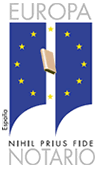
The documents granted by notaries may be of the following types:
Public Deeds
Documents drafted by notaries in accordance with the law, in which include declarations of intent, legal acts involving provision of consent and, in general, contracts of all classes. The most common acts or legal transactions formalized in a public deed are:
- Will and Testament: An individual, free, irrevocable legal act by which a person regulates his/her succession by naming one or more heirs.
- Marriage contract: An agreement between spouses whose essential aim is to accord a marital property regime, as well as settlement thereof.
- Power of Attorney: Authorization granted to another person in order to perform and execute specified legal and material acts on the behalf of another.
- Purchase agreement: A contract under which one party agrees to transfer ownership of an item or right to another, who, in turn, agrees to pay for it at an agreed price
- Mortgage loan: A loan, whose payment is secured by one or more real properties, be it homes, buildings, garages, parcels, agricultural land, etc.
- Constitution of corporations: The act of founding of a company where the basic elements are defined: initial capital, address, legal structure, etc. The basic types are limited liability companies and limited partnerships.
- Acceptance and partition of inheritance: An act by which the successors of a deceased person expressly accept the inheritance deferred in their favour, and carry out the inventory and distribution of assets.
Notarised Deeds
Documents for which, at the request of one party, the notary simply makes observations regarding facts. The fundamental types are:
- Notarial presence certificate: a notary record the facts that occur in their presence
- Act of formalisation: a notary logs documents exhibited in their protocol
- Act of reference or manifestation: the notary reports declarations that a person verifies in their presence
- Submission of documents by certified mail
- Act of requirement or notice to a third party
- Act of deposit of money or other items for temporary custody, etc.
A special type of act is the Declaration of intestate inheritance; the notary declares the family members named by the law to the estate of a deceased person without a will.
Policies
Documents of purely commercial and finance content, for example, loans, credit, leasing of personal property, bank guarantees, lines of discount, factoring contracts, renting or items on deposits or mutual funds. In common practice, notarised policies are drafted unilaterally and standardised by one of the contracting parties (generally, a credit entity).
Testimony
Sometimes called legalisation: Simple documents which may consist of the following::
- A notary verifies the identity and veracity of a signature given on a document (signature testimony or legitimation).
- A notary certifies that a copy is actually an exact replica of the original presented (testimony or certification of documents)
- The notary certifies the existence of a specified law in force in Spain or a legal statute of a company or other legal entity (testimony of current law).
- A notary certifies that a person is in their presence (testimony of existence or proof of life).

